- Home
- Robert Hugh Benson
Come Rack! Come Rope! Page 2
Come Rack! Come Rope! Read online
Page 2
CHAPTER II
I
There were excuses in plenty for Robin to ride abroad, to the northtowards Hathersage or to the south towards Dethick, as the whim tookhim; for he was learning to manage the estate that should be his oneday. At one time it was to quiet a yeoman whose domain had been riddenover and his sown fields destroyed; at another, to dispute with a millerwho claimed for injury through floods for which he held his lordresponsible; at a third, to see to the woodland or the fences broken bythe deer. He came and went then as he willed; and on the second day,after Anthony's visit, set out before dinner to meet him, that theymight speak at length of what lay now upon both their hearts.
To his father he had said no more, nor he to him. His father sat quietin the parlour, or was in his own chamber when Robin was at home; butthe lad understood very well that there was no thought of yielding. Andthere were a dozen things on which he himself must come to a decision.There was the first, the question as to where he was to go for Easter,and how he was to tell his father; what to do if his father forbade himoutright; whether or no the priests of the district should be told; whatto do with the chapel furniture that was kept in a secret place in aloft at Matstead. Above all, there hung over him the thought of whatwould come after, if his father held to his decision and would allow himneither to keep his religion at home nor go elsewhere.
On the second day, therefore, he rode out (the frost still holding,though the sun was clear and warm), and turned southwards through thevillage for the Dethick road, towards the place in which he hadappointed to meet Anthony. At the entrance to the village he passed theminister, Mr. Barton, coming out of his house, that had been thepriest's lodging, a middle-aged man, made a minister under the newPrayer-Book, and therefore, no priest as were some of the ministersabout, who had been made priests under Mary. He was a solid man, of nogreat wit or learning, but there was not an ounce of harm in him. (Theywere fortunate, indeed, to have such a minister; since many parishes hadbut laymen to read the services; and in one, not twenty miles away, thesquire's falconer held the living.) Mr. Barton was in his sad-colouredcloak and round cap, and saluted Robin heartily in his loud, bellowingvoice.
"Riding abroad again," he cried, "on some secret errand!"
"I will give your respects to Mr. Babington," said Robin, smilingheavily. "I am to meet him about a matter of a tithe too!"
"Ah! you Papists would starve us altogether if you could," roared theminister, who wished no better than to be at peace with his neighbours,and was all for liberty.
"You will get your tithe safe enough--one of you, at least," said Robin."It is but a matter as to who shall pay it."
He waved good-day to the minister and set his horse to the Dethicktrack.
* * * * *
There was no going fast to-day along this country road. The frosts andthe thaws had made of it a very way of sorrows. Here in the harder partswas a tumble of ridges and holes, with edges as hard as steel; here inthe softer, the faggots laid to build it up were broken or rottedthrough, making it no better than a trap for horses' feet; and it was afull hour before Robin finished his four miles and turned up through thewinter woodland to the yeoman's farm where he was to meet Anthony. Itwas true, as he had said to Mr. Barton, that they were to speak of amatter of tithe--this was to be their excuse if his father questionedhim--for there was a doubt as to in which parish stood this farm, forthe yeoman tilled three meadows that were in the Babington estate andtwo in Matstead.
As he came up the broken ground on to the crest of the hill, he sawAnthony come out of the yard-gate and the yeoman with him. Then Anthonymounted his horse and rode down towards him, bidding the man stay, overhis shoulder.
"It is all plain enough," shouted Anthony loud enough for the man tohear. "It is Dethick that must pay. You need not come up, Robin; we mustdo the paying."
Robin checked his mare and waited till the other came near enough tospeak.
"Young Thomas FitzHerbert is within. He is riding round his newestates," said the other beneath his breath. "I thought I would come outand tell you; and I do not know where we can talk or dine. I met him onthe road, and he would come with me. He is eating his dinner there."
"But I must eat my dinner too," said Robin, in dismay.
"Will you tell him of what you have told me? He is safe and discreet, Ithink."
"Why, yes, if you think so," said Robin. "I do not know him very well."
"Oh! he is safe enough, and he has learned not to talk. Besides, all thecountry will know it by Easter."
So they turned their horses back again and rode up to the farm.
* * * * *
It was a great day for a yeoman when three gentlemen should take theirdinners in his house; and the place was in a respectful uproar. From thekitchen vent went up a pillar of smoke, and through its door, in and outcontinually, fled maids with dishes. The yeoman himself, John Merton, adried-looking, lean man, stood cap in hand to meet the gentlemen; andhis wife, crimson-faced from the fire, peeped and smiled from the opendoor of the living-room that gave immediately upon the yard. For thesegentlemen were from three of the principal estates here about. TheBabingtons had their country house at Dethick and their town house inDerby; the Audreys owned a matter of fifteen hundred acres at least allabout Matstead; and the FitzHerberts, it was said, scarcely knewthemselves all that they owned, or rather all that had been theirs untilthe Queen's Grace had begun to strip them of it little by little onaccount of their faith. The two Padleys, at least, were theirs, besidestheir principal house at Norbury; and now that Sir Thomas was in theFleet Prison for his religion, young Mr. Thomas, his heir, was of moreaccount than ever.
He was at his dinner when the two came in, and he rose and saluted them.He was a smallish kind of man, with a little brown beard, and his shorthair, when he lifted his flapped cap to them, showed upright on hishead; he smiled pleasantly enough, and made space for them to sit down,one at each side.
"We shall do very well now, Mrs. Merton," he said, "if you will bring inthat goose once more for these gentlemen."
Then he made excuses for beginning his dinner before them: he was onhis way home and must be off again presently.
It was a well-furnished table for a yeoman's house. There was a linennapkin for each guest, one corner of which he tucked into his throat,while the other corner lay beneath his wooden plate. The twelve silverspoons were laid out on the smooth elm-table, and a silver salt stoodbefore Mr. Thomas. There was, of course, an abundance to eat and drink,even though no more than two had been expected; and John Merton himselfstood hatless on the further side of the table and took the dishes fromthe bare-armed maids to place them before the gentlemen. There was ajack of metheglin for each to drink, and a huge loaf of miscelin (orbread made of mingled corn) stood in the midst and beyond the salt.
They talked of this and of that and of the other, freely and easily--ofMr. Thomas' marriage with Mistress Westley that was to take placepresently; of the new entailment of the estates made upon him by hisuncle. John Merton inquired, as was right, after Sir Thomas, and openlyshook his head when he heard of his sufferings (for he and his wife wereas good Catholics as any in the country); and when the room was emptyfor a moment of the maids, spoke of a priest who, he had been told,would say mass in Tansley next day (for it was in this way, for the mostpart, that such news was carried from mouth to mouth). Then, when themaids came in again, the battle of the tithe was fought once more, andMr. Thomas pronounced sentence for the second time.
They blessed themselves, all four of them, openly at the end, and wentout at last to their horses.
"Will you ride with us, sir?" asked Anthony; "we can go your way. Robinhere has something to say to you."
"I shall be happy if you will give me your company for a little. I mustbe at Padley before dark, if I can, and must visit a couple of houses onthe way."
He called out to his two servants, who ran out from the kitchen wipingtheir mouths, te
lling them to follow at once, and the three rode offdown the hill.
Then Robin told him.
He was silent for a while after he had put a question or two, biting hislower lip a little, and putting his little beard into his mouth. Then heburst out.
"And I dare not ask you to come to me for Easter," he said. "God onlyknows where I shall be at Easter. I shall be married, too, by then. Myfather is in London now and may send for me. My uncle is in the Fleet. Iam here now only to see what money I can raise for the fines and for thesolace of my uncle. I cannot ask you, Mr. Audrey, though God knows thatI would do anything that I could. Have you nowhere to go? Will yourfather hold to what he says?"
Robin told him yes; and he added that there were four or five places hecould go to. He was not asking for help or harbourage, but advice only.
"And even of that I have none," cried Mr. Thomas. "I need all that I canget myself. I am distracted, Mr. Babington, with all these troubles."
Robin asked him whether the priests who came and went should be told ofthe blow that impended; for at those times every apostasy was ofimportance to priests who had to run here and there for shelter.
"I will tell one or two of the more discreet ones myself," said Mr.Thomas, "if you will give me leave. I would that they were all discreet,but they are not. We will name no names, if you please; but some of themare unreasonable altogether and think nothing of bringing us all intoperil."
He began to bite his beard again.
"Do you think the Commissioners will visit us again?" asked Anthony."Mr. Fenton was telling me--"
"It is Mr. Fenton and the like that will bring them down on us if anywill," burst out Mr. FitzHerbert peevishly. "I am as good a Catholic, Ihope, as any in the world; but we can surely live without the sacramentsfor a month or two sometimes! But it is this perpetual coming and goingof priests that enrages her Grace and her counsellors. I do not believeher Grace has any great enmity against us; but she soon will, if menlike Mr. Fenton and Mr. Bassett are for ever harbouring priests andencouraging them. It is the same in London, I hear; it is the same inLancashire; it is the same everywhere. And all the world knows it, andthinks that we do contemn her Grace by such boldness. All the mischiefcame in with that old Bull, _Regnans in Excelsis_, in '69, and--"
"I beg your pardon, sir," came in a quiet voice from beyond him; andRobin, looking across, saw Anthony with a face as if frozen.
"Pooh! pooh!" burst out Mr. Thomas, with an uneasy air. "The HolyFather, I take it, may make mistakes, as I understand it, in suchmatters, as well as any man. Why, a dozen priests have said to me theythought it inopportune; and--"
"I do not permit," said Anthony with an air of dignity beyond his years,"that any man should speak so in my company."
"Well, well; you are too hot altogether, Mr. Babington. I admire suchzeal indeed, as I do in the saints; but we are not bound to imitate allthat we admire. Say no more, sir; and I will say no more either."
They rode in silence.
It was, indeed, one of those matters that were in dispute at that timeamongst the Catholics. The Pope was not swift enough for some, and tooswift for others. He had thundered too soon, said one party, if, indeed,it was right to thunder at all, and not to wait in patience till theQueen's Grace should repent herself; and he had thundered not soonenough, said the other. Whence it may at least be argued that he hadbeen exactly opportune. Yet it could not be denied that since the daywhen he had declared Elizabeth cut off from the unity of the Church andher subjects absolved from their allegiance--though never, as somepretended then and have pretended ever since, that a private personmight kill her and do no wrong--ever since that day her bitterness hadincreased yearly against her Catholic people, who desired no better thanto serve both her and their God, if she would but permit that to bepossible.
II
It would be an hour later that they bid good-bye to Mr. ThomasFitzHerbert, high among the hills to the east of the Derwent river; andwhen they had seen him ride off towards Wingerworth, rode yet a fewfurlongs together to speak of what had been said.
"He can do nothing, then," said Robin; "not even to give good counsel."
"I have never heard him speak so before," cried Anthony; "he must benear mad, I think. It must be his marriage, I suppose."
"He is full of his own troubles; that is plain enough, without seekingothers. Well, I must bear mine as best I can."
They were just parting--Anthony to ride back to Dethick, and Robin overthe moors to Matstead, when over a rise in the ground they saw theheads of three horsemen approaching. It was a wild country that theywere in; there were no houses in sight; and in such circumstances it wasbut prudent to remain together until the character of the travellersshould be plain; so the two, after a word, rode gently forward, hearingthe voices of the three talking to one another, in the still air, thoughwithout catching a word. For, as they came nearer the voices ceased, asif the talkers feared to be overheard.
They were well mounted, these three, on horses known as Scottish nags,square-built, sturdy beasts, that could cover forty miles in the day.They were splashed, too, not the horses only, but the riders, also, asif they had ridden far, through streams or boggy ground. The men weredressed soberly and well, like poor gentlemen or prosperous yeomen; allthree were bearded, and all carried arms as could be seen from the flashof the sun on their hilts. It was plain, too, that they were not roguesor cutters, since each carried his valise on his saddle, as well as fromtheir appearance. Our gentlemen, then, after passing them with a saluteand a good-day, were once more about to say good-bye one to the other,and appoint a time and place to meet again for the hunting of whichRobin had spoken to Marjorie, and, indeed, had drawn rein--when one ofthe three strangers was seen to turn his horse and come riding backafter them, while his friends waited.
The two lads wheeled about to meet him, as was but prudent; but while hewas yet twenty yards away he lifted his hat. He seemed about thirtyyears old; he had a pleasant, ruddy face.
"Mr. Babington, I think, sir," he said.
"That is my name," said Anthony.
"I have heard mass in your house, sir," said the stranger. "My name isGarlick."
"Why, yes, sir, I remember--from Tideswell. How do you do, Mr. Garlick?This is Mr. Audrey, of Matstead."
They saluted one another gravely.
"Mr. Audrey is a Catholic, too, I think?"
Robin answered that he was.
"Then I have news for you, gentlemen. A priest, Mr. Simpson, is with us;and will say mass at Tansley next Sunday. You would like to speak withhis reverence?"
"It will give us great pleasure, sir," said Anthony, touching his horsewith his heel.
"I am bringing Mr. Simpson on his way. He is just fresh from Rheims. AndMr. Ludlam is to carry him further on Monday," continued Mr. Garlick asthey went forward.
"Mr. Ludlam?"
"He is a native of Radbourne, and has but just finished at Oxford....Forgive me, sir; I will but just ride forward and tell them."
The two lads drew rein, seeing that he wished first to tell the otherswho they were, before bringing them up; and a strange little thing fellas Mr. Garlick joined the two. For it happened that by now the sun wasat his setting; going down in a glory of crimson over the edge of thehigh moor; and that the three riders were directly in his path fromwhere the two lads waited. Robin, therefore, looking at them, saw thethree all together on their horses with the circle of the sun aboutthem, and a great flood of blood-coloured light on every side; thepriest was in the midst of the three, and the two men leaning towardshim seemed to be speaking and as if encouraging him strongly. For aninstant, so strange was the light, so immense the shadows on this sidespread over the tumbled ground up to the lads themselves, so vast thegreat vault of illuminated sky, that it seemed to Robin as if he saw avision.... Then the strangeness passed, as Mr. Garlick turned away againto beckon to them; and the boy thought no more of it at that time.
They uncovered as they rode towards the priest, and bowed low to
him ashe lifted his hand with a few words of Latin; and the next instant theywere in talk.
Mr. Simpson, like his friends, was a youngish man at this time, with akind face and great, innocent eyes that seemed to wonder and question.Mr. Ludlam, too, was under thirty years old, plainly not of gentleman'sbirth, though he was courteous and well-mannered. It seemed a greatmatter to these three to have fallen in with young Mr. Babington, whosefamily was so well-known, and whose own fame as a scholar, as well as anardent Catholic, was all over the county.
Robin said little; he was overshadowed by his friend; but he listenedand watched as the four spoke together, and learned that Mr. Simpson hadbeen made priest scarcely a month before, and was come from Yorkshire,which was his own county, to minister in the district of the Peak atleast for awhile. He heard, too, news from Douay, and that the college,it was thought, might move from there to another place under theprotection of the family of De Guise, since her Grace was very hotagainst Douay, whence so many of her troubles proceeded, and was doingher best to persuade the Governor of the Netherlands to suppress it.However, said Mr. Simpson, it was not yet done.
Anthony, too, in his turn gave the news of the county; he spoke of Mr.Fenton, of the FitzHerberts and others that were safe and discreetpersons; but he said nothing at that time of Mr. Audrey of Matstead, atwhich Robin was glad, since his shame deepened on him every hour, andall the more now that he had met with those three men who rode sogallantly through the country in peril of liberty or life itself. Nordid he say anything of the FitzHerberts except that they might be reliedupon.
"We must be riding," said Garlick at last; "these moors are strange tome; and it will be dark in half an hour."
"Will you allow me to be your guide, sir?" asked Anthony of the priest."It is all in my road, and you will not be troubled with questions oranswers if you are in my company."
"But what of your friend, sir?"
"Oh! Robin knows the country as he knows the flat of his hand. We wereabout to separate as we met you."
"Then we will thankfully accept your guidance, sir," said the priestgravely.
An impulse seized upon Robin as he was about to say good-day, though hewas ashamed of it five minutes later as a modest lad would be. Yet hefollowed it now; he leapt off his horse and, holding Cecily's rein inhis arm, kneeled on the stones with both knees.
"Your blessing, sir," he said to the priest. And Anthony eyed him withastonishment.
III
Robin was moved, as he rode home over the high moors, and down at lastupon the woods of Matstead, in a manner that was new to him, and that hecould not altogether understand. He had met travelling priests before;indeed, all the priests whose masses he had ever heard, or from whom hehad received the sacraments, were travelling priests who went in peril;and yet this young man, upon whose consecrated hands the oil wasscarcely yet dry, moved and drew his heart in a manner that he had neveryet known. It was perhaps something in the priest's face that had soaffected him; for there was a look in it of a kind of surprised timidityand gentleness, as if he wondered at himself for being so foolhardy, andas if he appealed with that same wonder and surprise to all who lookedon him. His voice, too, was gentle, as if tamed for the seminary and thealtar; and his whole air and manner wholly unlike that of some of thepriests whom Robin knew--loud-voiced, confident, burly men whom youwould have sworn to be country gentlemen or yeomen living on theirestates or farms and fearing to look no man in the face. It was thislatter kind, thought Robin, that was best suited to such a life--toriding all day through north-country storms, to lodging hardily wherethey best could, to living such a desperate enterprise as a priest'slife then was, with prices upon their heads and spies everywhere. It wasnot a life for quiet persons like Mr. Simpson, who, surely, would bebetter at his books in some college abroad, offering the Holy Sacrificein peace and security, and praying for adventurers more hardy thanhimself. Yet here was Mr. Simpson just set out upon such an adventure,of his own free-will and choice, with no compulsion save that of God'sgrace.
* * * * *
There was yet more than an hour before supper-time when he rode into thecourt at last; and Dick Sampson, his own groom, came to take his horsefrom him.
"The master's not been from home to-day, sir," said Dick when Robinasked of his father.
"Not been from home?"
"No, sir--not out of the house, except that he was walking in thepleasaunce half an hour ago."
Robin ran up the steps and through the screens to see if his father wasstill there; but the little walled garden, so far as he could see it inthe light from the hall windows, was empty; and, indeed, it would bestrange for any man to walk in such a place at such an hour. Hewondered, too, to hear that his father had not been from home; for onall days, except he were ill, he would be about the estate, here andthere. As he came back to the screens he heard a step going up and downin the hall, and on looking in met his father face to face. The old manhad his hat on his head, but no cloak on his shoulders, though even withthe fire the place was cold. It was plain that he had been walking upand down to warm himself. Robin could not make out his face very well,as he stood with his back to a torch.
"Where have you been, my lad?"
"I went to meet Anthony at one of the Dethick farms, sir--JohnMerton's."
"You met no one else?"
"Yes, sir; Mr. Thomas FitzHerbert was there and dined with us. He rodewith us, too, a little way." And then as he was on the point of speakingof the priest, he stopped himself; and in an instant knew that neveragain must he speak of a priest to his father; his father had alreadylost his right to that. His father looked at him a moment, standing withhis hands clasped behind his back.
"Have you heard anything of a priest that is newly come to theseparts--or coming?"
"Yes, sir. I hear mass is to be said ... in the district on Sunday."
"Where is mass to be said?"
Robin drew along breath, lifted his eyes to his father's and thendropped them again.
"Did you hear me, sir? Where is mass to be said?"
Again Robin lifted and again dropped his eyes.
"What is the priest's name?"
Again there was dead silence. For a son, in those days, so to behavetowards his father, was an act of very defiance. Yet the father saidnothing. There the two remained; Robin with his eyes on the ground,expecting a storm of words or a blow in the face. Yet he knew he coulddo no otherwise; the moment had come at last and he must act as he wouldbe obliged always to act hereafter.
Matters had matured swiftly in the boy's mind, all unconsciously tohimself. Perhaps it was the timid air of the priest he had met an hourago that consummated the process. At least it was so consummated.
Then his father turned suddenly on his heel; and the son went outtrembling.

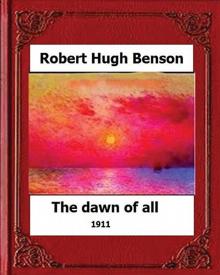 The Dawn of All
The Dawn of All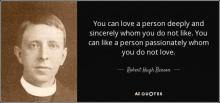 By What Authority?
By What Authority?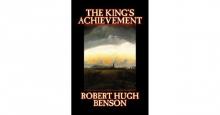 The King's Achievement
The King's Achievement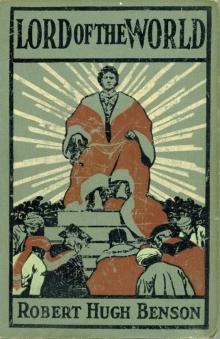 Lord of the World
Lord of the World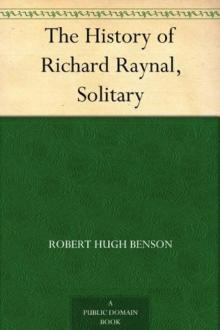 The History of Richard Raynal, Solitary
The History of Richard Raynal, Solitary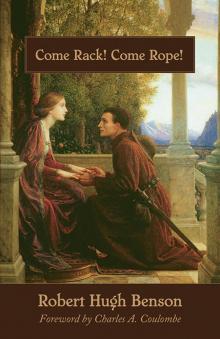 Come Rack, Come Rope
Come Rack, Come Rope